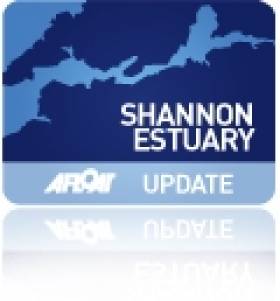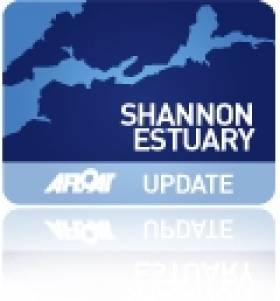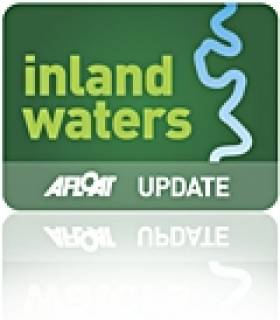Displaying items by tag: MulkearLIFE
Environmental Award For EU-Funded Project On Lower Shannon
#Shannon - The MulkearLIFE project in the Lower River Shannon Catchment is the recipient of the Chartered Institution of Water and Environmental Management's (CIWEM) Irish Environment Award for 2013.
MulkearLIFE is a European Commission LIFE+ Nature project working to restore degraded habitats through the Mulkear Catchment, which forms part of the Lower Shannon Special Area of Conservation.
The €1.75-million project, which has been active since late 2009, is spear-headed by Inland Fisheries Ireland (IFI), which act as co-ordinating beneficiary and works with key project partners in the Office of Public Works and Limerick County Council. The National Parks and Wildlife Service (NPWS) acts as project co-financier.
A range of other stakeholders support the project including local authorities (North & South Tipperary County Councils) as well as other state bodies (ESB Fisheries, Teagasc, Coillte, EPA) and especially the local community (IFA, ICMSA, Mulkear & District Angling Association, local schools and school children, farmers and volunteers).
In granting its Environment Award for 2013, the Republic of Ireland Branch of the CIWEM noted that MulkearLIFE is one of the most exciting and important river restoration and nature conservation projects ever undertaken on a catchment basis in Ireland. It noted that the project's work is providing a "conservation blueprint" for future integrated catchment management.
The project, which is centred on the Mulkear Catchment, covering an area of approximately 650 sqkm across counties Limerick and Tipperary, is focused on the rehabilitation of degraded river habitats, in particular the conservation and enhancement of habitat for the Atlantic salmon, sea lamprey and European otter.
Other work has concentrated on the control and treatment of non-native invasive riparian plant species and work to enhance local biodiversity. Significant efforts have been directed to creating an enhanced environmental awareness of the importance of the Mulkear Catchment as a resource for all. The local farming community has played a key role in this regard.
MulkearLIFE manager Ruairí Ó Conchúir noted that the success of the project has been highly dependent on an active catchment management partnership process and on extensive outreach work to enhance environmental awareness for those living within or near the catchment.
He noted that the project has worked hard to promote the importance of the Mulkear Catchment on a regional, national and international.
Ó Conchúir stated that a major objective has been the development of strong community links through a comprehensive environmental educational programme within local schools, in addition to actively managed practical conservation outings undertaken by the Mulkear Conservation Volunteers.
Suzanne Dempsey, chairperson of the Republic of Ireland Branch of CIWEM, said she was delighted to acknowledge the contribution of MulkearLIFE in bringing community and government together to plan, manage and enhance the conservation status of the Lower Shannon SAC.
She congratulated all involved in MulkearLIFE, especially the lead partners in Inland Fisheries Ireland, the OPW and Limerick County Council and wished the project every success.
IFI chief Ciaran Byrne thanked CIWEM for the award and the acknowledgement of the work of IFI and its project partners, as well as all involved in the success of the project to date, and especially those involved in MulkearLIFE’s catchment management grouping and local farmers on the ground.
Minister of State Fergus O’Dowd commended the efforts of the MulkearLIFE team and the funding support of the European Commission LIFE+ Programme. He noted that the funding support was of critical importance in allowing the project to undertake much of its work over the last four years, and he expressed his hope that the work would continue into 2014.
Illustrated Talks On Shannon's Natural Heritage Throughout February
#Shannon - MulkearLIFE and Inland Fisheries Ireland have announced details of a series of free illustrated talks taking place in Limerick throughout February on the extraordinarily rich natural heritage of Ireland, and in particular the Lower Shannon.
The talks form part of MulkearLIFE’s Environmental Education Programme, an outreach programme in local schools and the local community in the Mulkear catchment. The series will be hosted over four Tuesday evenings and will include leading experts sharing their knowledge on farming and conservation and biodiversity management.
Among the talks will be the fascinating story of Atlantic salmon in the River Shannon, presented by Dr Phil McGinnity on 12 February. Dr McGinnity is Beaufort Principal Investigator with UCC’s Aquaculture & Fisheries Development Centre, with more than 23 ears of experience in fisheries science and management, and his talk will outline new and extremely exciting research on the genetic make-up of various salmon types found in the Shannon. He will also examine the history of salmon fisheries on the Shannon. His talk should be of particular interest to anglers far and wide and anyone with a general interest in Irish biodiversity.
On 19 February, Colette O’Flynn will relate the scary story of what is emerging in terms invasive non-native animals and plants arriving into Ireland's coastal and inland waterways. O’Flynn is a research officer with the National Biodiversity Data Centre in Waterford. She manages the National Invasive Species Database for Ireland, which tracks non-native invasive animals and plants in Ireland. She is involved with many European and international invasive species information networks and has been involved with invasive species policy development for the European Commission. She previously worked in various areas in biodiversity education and awareness. Her talk should be of interest to a wide variety of people, especially anglers and those with an interest in Irish wildlife and general biodiversity.
The series of illustrated talks will conclude on 26 February with a talk by Eamon Cusack on building partnerships for sustainable fisheries on the Lower Shannon. Cusack is extremely well known in the fisheries world with over 35 years experience in inland fisheries management. As the former CEO of the Shannon Regional Fisheries Board, he encountered many of the challenges facing fisheries management, and has hands-on experience of policy development, strategic management, change management, enforcement, development and rehabilitation. This talk will focus on his recent work to bring together anglers and the ESB to provide to build effective and durable partnerships for sustainable fisheries. His talk should be of particular interest to local anglers and anyone with a general interest in conservation management and planning.
But the series begins on 5 February with a talk presented by Ruairí Ó Conchúir on conservation farming and biodiversity in the Upper Mulkear Catchment. Ó Conchúir is the manager of MulkearLIFE and has worked in land care management, rural development, farming for conservation and fisheries restoration work for over 20 years, including 10 years in Southern Africa. His talk will focus on the work of MulkearLIFE with farmers over the past three years, with a particular emphasis on partnership work with farmers to improve local habitats. The talk will also attempt to map out where upland farming in Ireland is heading and review work in other uplands parts of Ireland, and outline the likely implications are for upland communities, related farming and habitats post 2014. His talk should be of particular interest to anyone with a general interest in farming, the Irish uplands and the future of EU agri-environmental supports post 2014.
The venue for all talks is the Inland Fisheries Ireland office at Ashbourne Business Park, Dock Road, Limerick. There is plenty of free parking at the front of the building at night. Talks will commence at 8pm sharp and there is free admission to all talks. Further information regarding any of the talks may be obtained from the project [email protected] or from MulkearLIFE, Inland Fisheries Ireland (Limerick) at 061 300 238 or 087 062 5582.
Amateur Photo Contest Celebrates Shannon's Biodiversity
#LIFE ON THE SHANNON - MulkearLIFE has launched its amateur photo competition for 2012, with a prize fund of €1,000 on offer.
The contest celebrates the 20th anniversary of the EU LIFE programme and has the theme of ‘Exploring the Biodiversity of the Lower Shannon’. Images may cover any aspect of the theme, and can be submitted in any style from macro to landscape, black and white or colour.
There is no end to what type of image can be submitted. It could be an image of water, trees, plants, fish, invertebrates, fungi, mammals, birds, lichen, domestic animals - basically any living organism.
Though not essential, images that portray biodiversity in and along rivers, streams and waterways throughout the Lower Shannon region would be preferred.
Entry is free, and entrants can submit up to three images. Prizes will be offered in two categories: Children/Young Adults and Adults.
In addition, the overall winner will receive one full day's training in wildlife and landscape photography from a leading wildlife photographer later in 2012.
Full details of how to enter the competition are available on the MulkearLIFE website HERE. The closing date is 1 May 2012 at 5pm.
































































